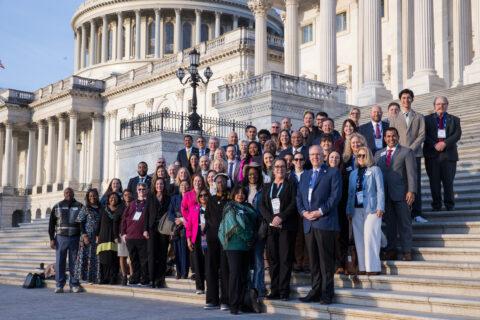As part of the House Republican’s “One, Big, Beautiful Bill” legislation to extend the 2017 tax cuts, the House Ways and Means Committee was charged with spending up to $4.5 trillion to extend and make permanent provisions from the 2017 Tax Cuts and Jobs Act (TCJA) while also implementing President Trump’s campaign promises of no tax on tips, overtime or Social Security.
On May 14, the Committee passed the bill (PDF) along a party line vote. After changes by the House Budget Committee and the House Rules Committee (PDF), the bill passed the House on May 21.
Here is a section-by-section summary (PDF) provided by the Ways and Means Committee and a look at key provisions for local governments as approved by the House.
Top Local Government Priorities
- Municipal Bonds: Preserves the tax exemption for municipal and private activity bonds. This top priority for NLC is a critical win for municipal financing for infrastructure and a host of other development needs.
- Low-Income Housing Tax Credit: Increases the volume of low-income housing tax credits by 12.5% and reduces the required bond financing threshold to 25% through 2029. These long-sought improvements aim to boost the construction and preservation of affordable rental housing.
- SALT Deduction: Raises the State and Local Tax (SALT) deduction cap from $10,000 to $40,000 for single and joint filers earning under $400,000 annually.
- Elective Pay Tax Credits for Clean Energy Projects: Maintains the direct pay provision for local clean energy projects in practice, but makes changes to the tax credits that could reduce their utility to local governments:
- Eliminates tax credits for electric vehicles and charging infrastructure as well as for Alternative Fuels as of 12/31/2025.
- Accelerates phase out of clean energy production and investment tax credits beginning in 2029, but the credits are generally unavailable for any project that begins construction more than 60 days after the date of enactment, or which is placed in service after 2028.
- Establishes “Foreign Entities of Concern” restrictions that impact project components.
- Opportunity Zones: Updates and extends the Opportunity Zones program, incentivizing investment in distressed communities from 2027 through 2033. Key updates include:
- 33% of new zones must be rural.
- Zones must have at least 20% poverty or median incomes below 70% of area averages (down from 80%).
- No zones can exceed 125% of area median income or be contiguous tracts.
- Debt Limit Increase: Increases the debt ceiling by $4 trillion.
Extension of 2017 Tax Law Provisions
Several expiring provisions from the 2017 Tax Cuts and Jobs Act would become permanent:
- Marginal Tax Rates: Lower individual tax rates would continue past 2025.
- Standard Deduction: The expanded standard deduction would be made permanent, with a temporary boost from 2025–2028 ($1,000 for individuals, $2,000 for joint filers).
- Child Tax Credit: Increased to $2,500 through 2028, then reverts to $2,000.
New Individual Tax Deductions
The bill introduces temporary deductions from 2025–2028:
- Tip Deduction: Allows certain employees to deduct reported tips. High earners (over $80,000) are excluded.
- Overtime Deduction: Offers a similar benefit for overtime pay, excluding tips.
- Senior Deduction: Taxpayers 65+ could deduct an extra $4,000, phasing out for individuals earning over $75,000 or couples earning more than $150,000.
What Local Leaders Can Do
The Senate is expected to amend the House bill, which could lead to substantial rewrites of certain sections. Local leaders should continue to urge Congress to preserve the municipal bond tax exemption and other key provisions that support local investment.
- Use this form to send a message to your Congressional delegation supporting the tax exemption of municipal bonds.
- Let your Congressional delegation know how your community has utilized the elective pay tax credits for clean energy projects.
- Read NLC’s letter to Congress on local government tax priorities.
Stay Informed
Sign up for NLC’s bi-weekly Federal Advocacy Update Newsletter to learn more about how we’re advocating for cities, towns and villages, plus ways to get involved.











